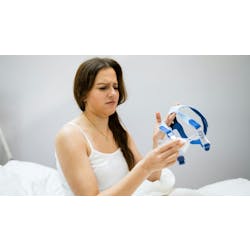by Anne Nugent Guignon, RDH, MPH
Human nature is fascinating. The world would be really dull if everyone acted or reacted in the same way. Diversity creates some interesting communication challenges that come into play every time we interact with a patient.
As professionals, we understand the attendant risks and potential health outcomes when patients do not follow our advice. In my opinion, many dental professionals set themselves up for frustration or defeat when they expect patients to follow every recommendation. Every patient is a unique individual with a distinctive mix of thoughts, goals, priorities, and interests. Our values and professional standards are ours, not necessarily those of our patients. To expect others to embrace our ambitions at the same level as we do is a recipe for professional burnout.
Dental professionals believe it is their duty to educate patients, but I'm not sure if educating patients is the right approach. Most people don't like to be told what to do. From a patient's point of view, the term educate means to lecture, which by its very nature implies some type of judgment has been made.
When patients sense that we're in lecture mode, they stop listening and learning. There is no way the lecture will result in positive actions, no matter how hard we try. Every time dental professionals use the word educate, a weird cartoon pops into my head. It features a person with a blank stare. The top of the head is propped open like the hood of car, with a giant funnel labeled "The Lecture" pouring words into the cartoon head.
Educating patients often means using the same worn out phrases and repeating the same scare tactics. Patients are on to us. Consider how the outcome could differ if we focus on providing information rather than concentrating our efforts on what we think will be effective. Working with patients who smoke is a perfect example. Everyone who uses tobacco understands that it is not a healthy activity. It is a waste of breath and emotional energy to try to educate them on the evils of tobacco. The net result is annoyed patients who tune out the message.
I know this is true. As a heavy smoker in my 20s, I knew the health risks, but I didn't care. The addiction was greater than my desire to quit. The thought of a tobacco-related illness did not register in my 20-something mind. When I finally made up my mind to quit, it took a year of mental preparation to set the stage for success. Friday, May 13, 1978, was my quit date. Overcoming tobacco addiction armed me with tools that I use regularly to help others kick the nicotine habit or move forward with some other health-related lifestyle action.
Forget scolding. It doesn't work. It is often impossible to discover a patient's hot buttons. If you don't know what will move someone off dead center, then your pleas for behavior modification will fall on deaf ears. Create a dialogue that puts you in partnership with your patient and take yourself out of a judgment role.
For patients who use tobacco, consider saying, "Some day I know you'll want to quit. When that time comes, just let me know. I'll be here for you and I'll be happy to provide you with any help I can. I'm looking forward to that day." Voila! No scolding, no preaching, no educating, but rather a simple offer to provide information and unconditional support.
Throughout the years, a number of my patients have been successful in quitting tobacco. Dennis was a heavy smoker for close to 50 years. For four decades I cared for this relentless smoker, always documenting current tobacco intake, never thinking he would quit. At every three-month appointment he bragged about enjoying smoking, and that he would rather die happy than give up something he loved. Rather than cut off the dialogue, I kept my focus non-judgmental, assuming the role of a personal coach rather than a professional scolder. As an adult, he was in charge of his lifestyle and any subsequent health risks.
Speaking of love, Dennis made getting married a personal pastime, tying and untying the knot five times. Smoking was usually an issue with his partners. Dennis, now retired and single again, travels around the country with Jake, his dog. Jake hated Dennis' smoking and would hide every time he lit up. Last summer the two ended up in the Rocky Mountains. Dennis couldn't catch his breath when he took Jake for a walk. Desperate to keep his new relationship alive, Dennis decided to try quitting one more time.
His physician prescribed a new medication. The side effects were brutal, but Dennis was able to beat his tobacco addiction. Apparently, he had been trying to quit for years. Who knows why it worked this time, but now there is one less smoker on the planet. I never gave up hope that he would quit, and I knew that taking a non-judgmental approach would make it possible to continue our open professional relationship.
A variation of this tactic applies to patients who just won't schedule necessary dental work or comply with recommendations for home care routines or appointment intervals. Again, for reasons unknown to us, patients will not share the reasons for their reluctance to proceed with treatment. Some feel it is none of our business. Others are ashamed. Some are concerned about pain. Others have overwhelming life issues or are scared about procedural details. Some have limited financial resources, or may not feel the treatment is truly necessary. Others lack trust in the dental provider. Respect the possibilities that recommended treatment will not be accepted. Treatment recommendations are just that, recommendations, not promulgations from a greater being.
In the end, we are responsible for making thoughtful recommendations based on careful diagnoses, supported by the most current scientific information. In the end, we are responsible for our own behavior and should not judge our professional success or failure by our patients' actions or subsequent health outcomes.
Lectures don't work. Acceptance and support are key. People will let you know when and how they want your professional help. When they do, you know that you have created a special professional comfort zone where you'll be the best cheerleader they've ever had.
About the Author
Anne Nugent Guignon, RDH, MPH, is the senior consulting editor for RDH magazine. She is an international speaker who has published numerous articles and authored several textbook chapters. Her popular programs include ergonomics, patient comfort, burnout, and advanced diagnostics and therapeutics. Recipient of the 2004 Mentor of the Year Award, Anne is an ADHA member and has practiced clinical dental hygiene in Houston since 1971. You can reach her at [email protected] or (832) 971-4540, and her Web site is www.anneguignon.com.





